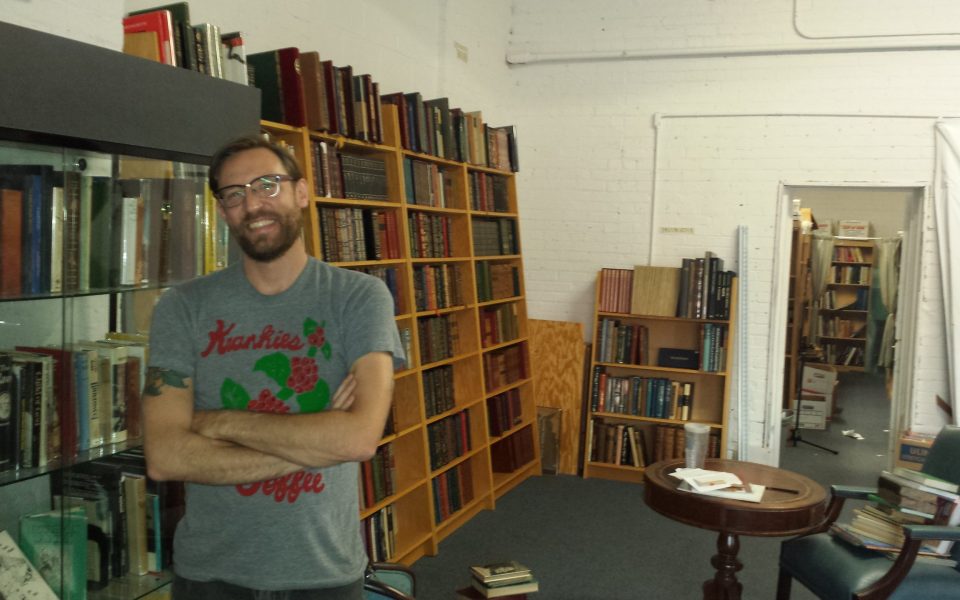by Brian Clarey
Of all the million stories in the thousands of volumes crammed onto the shelves at Empire Books, the one proprietor Mark Wingfield tells on his last day may be the most poignant.
It’s the story of Empire Books itself, a partnership between two boyhood friends from West Virginia begun at a quarter-life crossroads.
In 2002, Wingfield was living in Pittsburgh, and had recently returned from an archaeological dig in Italy in preparation for graduate study in the field. And then it all fell apart. The place where he worked went bust. His apartment got sold out from under him. His girlfriend left him. And after the dig in Italy, he wasn’t so sure he wanted to go into archaeology.
His childhood buddy Shane Straight had recently graduated from Guilford College. He convinced Wingfield to move down, and got him a job where he worked, at Edward McKay’s Used Bookstore in Greensboro.
Straight had been using his employee discount to amass a small collection of valuable books that he began selling online. He built the business up and left McKay’s in 2004 to pursue it full time. Within six months he convinced Wingfield to join him in the venture.
“F*** it, why not?” Wingfield remembers thinking. “Sounds great. I love books. He’s my best friend. It sounds perfect.”
After a couple “hard seasons on the road” gathering inventory at book shows, auctions and sales across the country, they realized it would be more efficient to have a brick-and-mortar presence.
“We were like, ‘Let’s open a shop, have people bring books to us,’” Wingfield says. “It was crazy how quickly we opened once we decided to do it.”
Empire Books opened near the campus of Straight’s alma mater in May 2005. With the help of Straight’s father they built all the shelving and counter space. With a good following of dedicated readers, the textbook business from Guilford College and UNCG and a growing trade in collectibles, things were going well. Until they weren’t.
In March 2009, Straight committed suicide. Wingfield cites stress and depression as the causes, that it made sense in hindsight but that at the time he didn’t see it coming. It was all falling apart again.
Wingfield takes it easy on his last day in the shop, posted at his desk behind a bulwark of novels, reference books, graphic novels and the husks of bestsellers past. Crkt Leggett, a longtime ally, applies clear covers to some of the more fragile hardcovers.
It’s a new location, sharing a parking lot with the Blind Tiger on Spring Garden Street. Wingfield moved here in 2011, two years after he decided to keep the thing going.
After Straight’s death, he says, “I took some time off. Two months. I traveled, visited friends, had a lot of serious conversations.
“I came back and realized there was no reason to run. I had built this with my friend. It would have been more of a disservice to him — and myself — to walk away. I decided to make it something we could both be proud of.”
In the new space, he held music events, readings, experimental performance art and a growing number of enthusiasts.
“Brian [Lampkin] from Scuppernong was a customer here for years,” he remembers.
A new buyer from Winston-Salem comes on Oct. 1. By Halloween, Wingfield will be a full-time resident of Baltimore. He says he’s partially moving for love — that’s where his girlfriend lives — but that there are larger issues at stake.
“It was really time to move on,” he says. “I felt like I had plateaued — admittedly, partially my fault — but I felt like, it’s hard to stay in the consciousness of a city with such a transitory population.”
Such is the way with stories. Sometimes the setting needs to change.
Join the First Amendment Society, a membership that goes directly to funding TCB‘s newsroom.
We believe that reporting can save the world.
The TCB First Amendment Society recognizes the vital role of a free, unfettered press with a bundling of local experiences designed to build community, and unique engagements with our newsroom that will help you understand, and shape, local journalism’s critical role in uplifting the people in our cities.
All revenue goes directly into the newsroom as reporters’ salaries and freelance commissions.


Leave a Reply